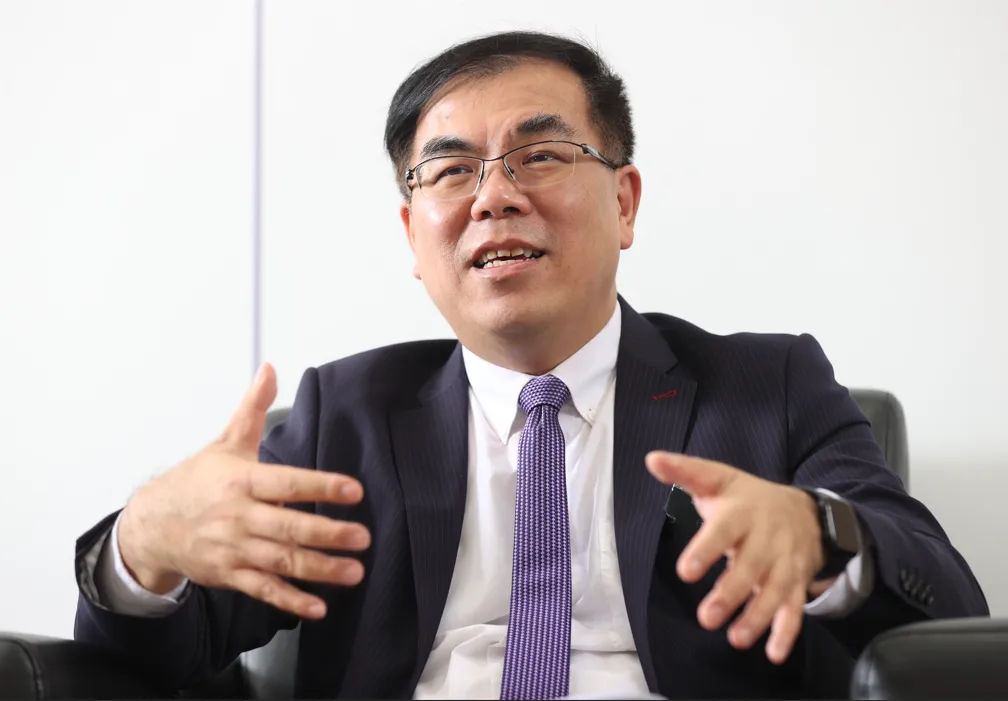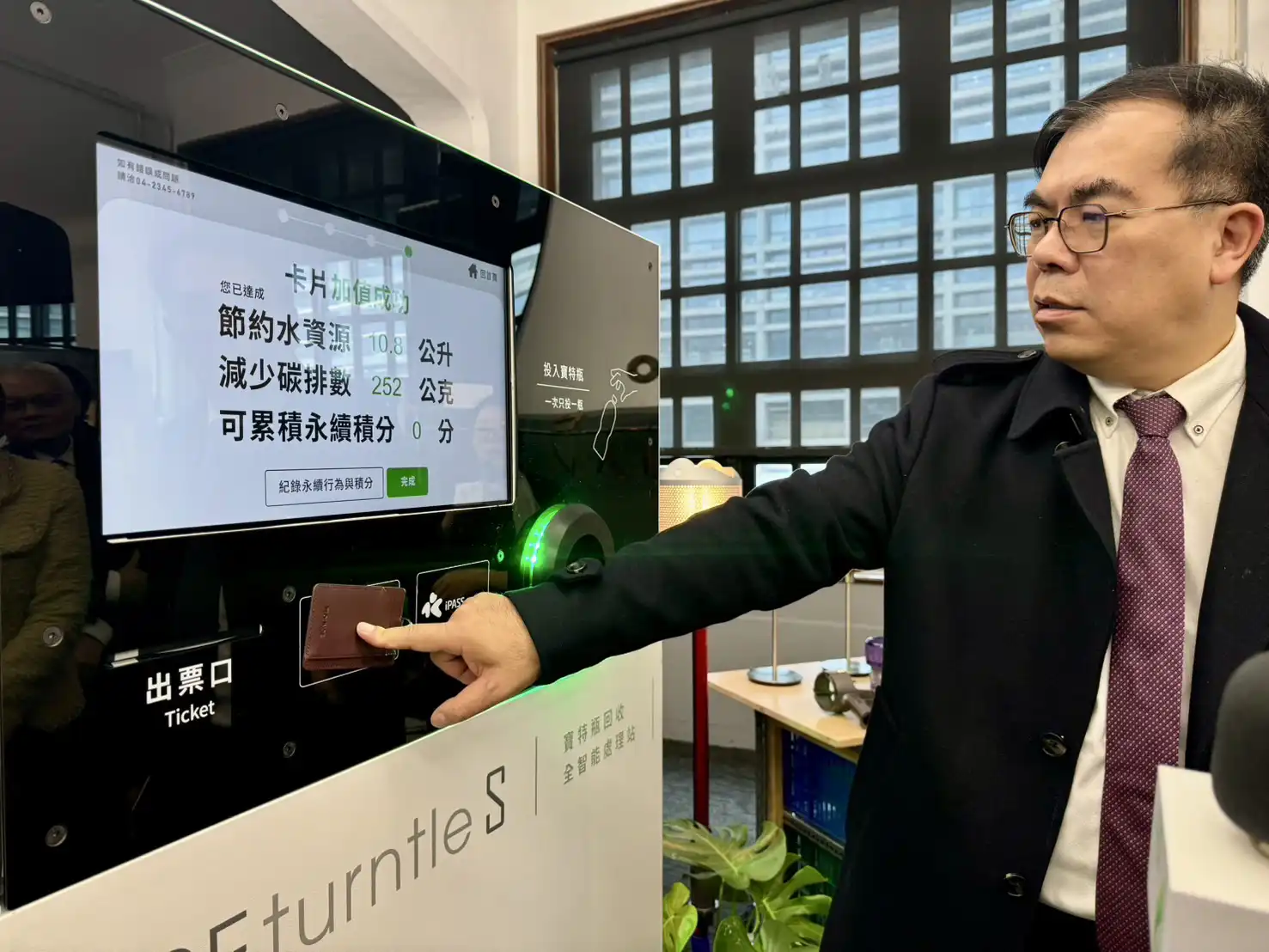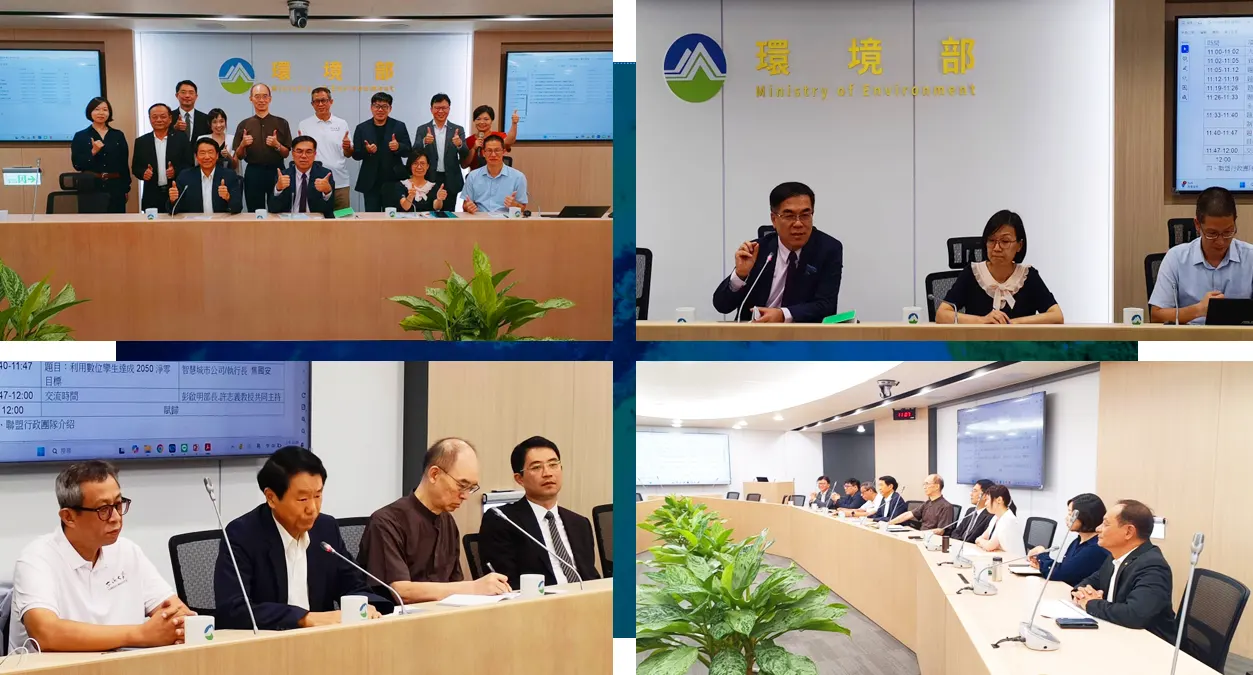Green Growth Strategy: Transforming Taiwan's New Sustainable Paradigm

Green Growth Strategy: Transforming Taiwan's New Sustainable Paradigm
By Wu Xin-En
During the 2024 National Day address, President Lai Qing-de stated, "We will continue to promote the second energy transition to ensure the stability of energy supply." Similarly, at the second Presidential Office "Climate Change Response Committee" meeting held on October 24, 2024, it was emphasized that Taiwan must advance the "second energy transition" not only to secure a stable and resilient energy supply but also to deepen energy conservation measures, promote the application of energy storage technologies, drive the transformation and development of next-generation industries, and strengthen Taiwan's climate adaptation mechanisms. This comprehensive approach aims to seize opportunities for sustainable green growth on the steady path toward achieving net-zero emissions by 2050.

Chi-Ming Peng, Exclusive Interview with Minister of MOENV
Having risen from the private sector and renowned as a meteorological expert, Peng—who also serves as the Executive Secretary of the Presidential Office Climate Change Response Committee—stands at the forefront of orchestrating the nation's net-zero sustainability strategy across multiple government agencies and disciplines. Chi-Ming Peng expresses a distinct sense of mission regarding Taiwan's efforts in sustainable development and energy transition. "MOENV is not only the executor of policy but also a key force in leading a comprehensive societal transformation," he asserts. "In this process, the synergy between technological innovation, policy support, and social participation is indispensable."
Peng believes that Taiwan's environmental challenges represent both crises and opportunities. "MOENV's mission is to establish an adaptive framework and set clear directions so that other relevant agencies and the private sector can take proactive measures," he emphasizes. He further underlines that environmental sustainability and economic development are not a zero-sum game; rather, they complement each other—even as the nation increasingly prioritizes environmental protection. He notes that Taiwan's significant potential in renewable energy technologies, smart cities, and green finance resonates with emerging fields such as the circular economy and virtual power plants (VPPs), which play a critical role in achieving industrial decarbonization.

Circular Economy: A Paradigm Shift in Thinking
"Circular economy represents a comprehensive shift in mindset. It is not simply about recycling resources; it begins at the design stage—rethinking how to maximize resource efficiency," Peng explains. He notes that Taiwan's economic model is gradually transitioning from a traditional linear economy toward a circular economy, with enormous potential for implementation in the renewable energy sector.
From a regional perspective, urban development holds great promise for circular economy practices. Cities inherently possess abundant resources that are often overlooked or wasted. If these resources are integrated effectively, they can generate tremendous value. "For instance, integrating energy and waste management systems is crucial for future urban development," he elaborates. Many cities still operate under a linear economic model, yet urban areas are critical arenas for the aftermarket of virtual power plants.
"Cities should shift their perspective and view all assets as components of resource circulation," Peng states. Taking waste as an example—historically treated as an undesirable facility (no one wants a waste treatment plant near their home)—there is now an opportunity to rethink waste management using digital technologies to achieve smart waste collection and processing systems, thereby maximizing resource utilization. Moreover, through recycling and reuse, urban waste can be transformed into new products and energy, reducing dependence on external resources and enhancing urban resource autonomy. For example, converting food waste into bioenergy or recycling wastewater for power generation while significantly reducing pollution are practices that can boost urban sustainability and energy self-sufficiency.

Peng states that Taiwan has already become a green energy demonstration country in Asia. Taiwan must not only meet its own energy demands but also leverage innovative models like VPPs to make its technology and green energy influential on the global stage.
In addition, the aftermarket of virtual power plants offers another key avenue for maximizing the value of urban assets. Every household equipped with distributed renewable energy becomes a vital element in this circular economy framework.
Peng emphasizes that a consensus has already been reached toward promoting a circular economy law, with various government departments actively reviewing policy frameworks for urban circular economy initiatives to further assist and encourage enterprises and citizens to participate. He notes that the success of urban circular economy promotion hinges on the participation and collaboration of everyone—from citizens and businesses to government agencies. "We need to establish a society-wide participatory system that makes the circular economy part of everyday life. This will be an essential path for future urban development."
Promoting a circular economy requires a dual drive from technological innovation and market mechanisms. "Taiwan is already at the forefront of renewable energy technological innovation, but we need a better market environment to facilitate its application and expansion." Peng suggests that enhancing the transparency and digitalization of the carbon trading market—for example, using blockchain technology to ensure data integrity and lower transaction costs—can attract more corporate participation. Fully leveraging existing resources and equipment aligns with the core objective of the circular economy: to achieve maximum efficiency with minimal resources.

Virtual Power Plants: The Pillar of the Future Energy Market
When discussing power market reforms, Peng highlights that the future energy market will not adhere to a single traditional model but will evolve into a highly integrated green energy market, with VPPs serving as a central pillar in promoting decarbonization. "There is ample evidence that virtual power plants facilitate the green transition of energy, leading to decarbonization," Peng states. "By effectively integrating distributed renewable energy sources, energy storage systems, and end-user energy resources, we can ensure stable power dispatch, reduce pressure on traditional grids, and lower carbon emissions—all while enhancing the intelligence and resilience of the power system."
Current revisions to the Electricity Act are also being planned to ensure that virtual power plants can participate in real-time electricity trading in a more flexible manner, enabling distributed energy and demand response mechanisms to truly integrate into market operations. In this way, distributed renewable energy will no longer be just a supplementary power source but will become a core provider of low-carbon energy, reducing reliance on fossil fuels.
"Technology and policy must work in close coordination," Peng asserts. He believes that energy policy should be more closely integrated with carbon pricing. The government could establish clear performance indicators to encourage enterprises to invest in high decarbonization potential technologies and ensure that subsidy funds are directed to projects with substantial impact.
"Another key point is education and raising awareness," Peng insists. He emphasizes that enabling every citizen to understand the value of the circular economy and be willing to change their lifestyle is fundamental to driving this transformation. "When everyone rethinks the value of resources, the circular economy becomes not just a policy or industry responsibility, but a shared way of life."
Scope 1 Decarbonization: Key to Maximizing Renewable Energy Deployment
"Scope 1 decarbonization is essentially about addressing the problem at its source," Peng explains further. The core of decarbonizing energy lies in significantly increasing the share of renewable energy and transforming it into genuinely environmentally beneficial power. To this end, he proposes three core strategies for maximizing green energy deployment: technological innovation, policy guidance, and cross-sector collaboration.
"For example, virtual power plants can integrate solar and energy storage systems built on private facilities, thus enabling Scope 1 energy to have its own source of energy," Peng points out. He notes that while Taiwan has natural advantages in solar and wind resources, possessing resources alone is insufficient for Taiwan to achieve an aggressive decarbonization or net-zero industrial structure.
The role of the government is critical. The advancement of energy decarbonization requires robust policy support. "The government should use clear regulations and incentive mechanisms to encourage enterprises to use green power and participate in decarbonization initiatives." He cites examples of Taiwan planning to introduce more green power procurement mandates for high-energy-consuming enterprises and to accelerate improvements in the green energy certificate system, thereby facilitating easier participation in the international carbon trading market.
Additionally, Peng stresses the importance of fostering a vibrant green energy market to allow for the emergence of innovative business models. He explains that the integration of virtual power plants with blockchain technology could make renewable energy trading more transparent and efficient, attracting more private capital to invest in green energy infrastructure.

Peng is widely regarded as the most down-to-earth minister, frequently delivering presentations in person and using straightforward, everyday language on livestreams to clarify complex environmental policies and circular economy models.
Driving Energy Decarbonization: The Necessity of Cross-Sector Collaboration and Public Engagement
"Energy decarbonization is not solely the responsibility of the energy sector; it is a systemic transformation that requires the participation of the entire society," Peng emphasizes. He points out that advancing green energy development must involve the integration of various sectors. For instance, collaborating with the construction industry to develop zero-carbon building technologies and promote standardized green building certifications; working with the transportation sector to establish smart electric vehicle charging networks to enhance infrastructure efficiency; and partnering with the technology sector to develop VPPs and smart energy management platforms, making energy use more flexible and efficient.
"Public participation is key to driving energy decarbonization. Whether it's urban citizens, environmental organizations, or small and medium-sized enterprises, everyone can support the development of virtual power plants through concrete actions," Peng stresses. He notes that citizens can optimize their energy usage habits, install smart meters, and participate in community-based renewable energy projects to contribute to the management of distributed energy; environmental groups can serve as advocates, promote green energy concepts, and provide technical support; and SMEs can act as testing grounds for innovative solutions by participating in pilot projects for renewable energy procurement and energy optimization, thereby adding flexibility and innovation to the system.
Peng further points out that virtual power plants represent an innovative concept that breaks the traditional energy economic structure. By integrating distributed energy resources such as solar, wind, small-scale energy storage systems, and even electric vehicle charging facilities, Taiwan can improve energy management efficiency and reduce carbon emissions. "This not only promotes a nationwide energy transition but also spurs local economic development and the growth of green employment opportunities."

On August 9 2024, the Taiwan Industry-Academia Technology Alliance for Energy Digital Transformation (TAEDT), led by Director Professor George Hsu and Secretary-General Dr. David Hsieh, visited the Ministry of Environment (MOENV) for perspectives exchange. Minister Chi-Ming Peng personally received the alliance representatives and listened to their recommendations regarding net-zero carbon emissions and environmental sustainability. The discussion topics encompassed the domestic virtual power plant circular economy and legacy waste management, international carbon credit applications, and green certification.
"Taiwan has already become a green energy demonstration country in Asia," Peng states. He explains that Scope 1 decarbonization is the cornerstone for achieving the 2050 net-zero transformation. Advancing the energy transition from a holistic perspective and actively engaging in international cooperation will allow Taiwan to export its experiences and technologies to emerging markets—particularly in terms of technology transfer and management model export—which is a vital development strategy for Taiwan. "Taiwan must not only meet its own energy demands but also leverage innovative models like virtual power plants to make our technology and green energy influential on the global stage."
Through nationwide participation, cross-sector collaboration, and improvements in economic systems, Taiwan's path to energy decarbonization is not merely an internal transformation but also a transmission of value to the world, offering inspiration for global sustainable energy. Decarbonization is not a single solution but the result of multifaceted efforts. "If we can strike the right balance among technological innovation, policy support, and social participation, Taiwan's energy decarbonization process will not only be successful but could also serve as a global benchmark," Peng concludes.
With strong confidence in Taiwan's future sustainable development, Peng calls for collective societal effort: "Our policies are not just aimed at short-term decarbonization goals—they are designed to establish a sustainable environment for the next generation."
More related articles
